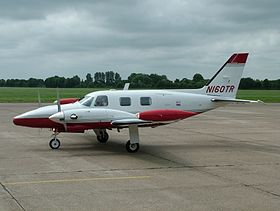Plane crash in Trudering
| Plane crash in Trudering | |
|---|---|
|
A Piper PA-31T Cheyenne II in Groningen |
|
| Accident summary | |
| Accident type | Stall |
| place | Munich-Trudering , Germany |
| date | August 11, 1987 |
| Fatalities | 3 |
| Survivors | 0 |
| Fatalities on the ground | 6th |
| Injured on the ground | 30th |
| Aircraft | |
| Aircraft type | Piper PA-31T Cheyenne II |
| operator | Lechmetall Landsberg |
| Mark | D-ILRA |
| Departure airport | Landsberg |
| Destination airport | Munich-Riem |
| Passengers | 2 |
| crew | 1 |
| Lists of aviation accidents | |
On August 11, 1987, nine people were killed in a plane crash in Trudering (Munich) .
Course of events
The pilot of the Piper PA-31T Cheyenne II , a professional pilot and very experienced on the Cheyenne, was on a check flight to extend his ATPL with an examiner and a secretary from the Air Office South Bavaria . The machine with the registration D-ILRA was the works aircraft of a Bavarian metal construction company. During the landing approach shortly before runway 07R in Riem , the examiner intervened surprisingly and - as the aircraft accident investigation department at the LBA later determined - "without notice in a completely unsuitable situation" around 60 meters above the ground the power lever of the right engine to idle.
The pilot should show that he can land the machine even if one of the engines fails. A standard procedure, but because of the torque of the left engine - and the surprising lack of compensatory torque of the right turbine - the machine turned around its longitudinal axis to the right and down and picked up speed. Thanks to the drive, the pilot was able to intercept the machine just above the road. However, one meter above the ground. With propellers scratching the ground, she slid across the intersection of Wasserburger Landstrasse , beheaded a cyclist with her wing nose, brushed against a bus on route 192. Its driver lost control and drove into a McDonald’s restaurant. The machine also slammed into the building. A wing tore, the kerosene ignited and set fire to the building, aircraft and parts of the bus.
The three occupants of the plane died instantly. Three other people died on the ground. In the following weeks three of the 30 injured died. The restaurant was destroyed and rebuilt in the same place.
Criticism and consequences
The accident led to a reform of the examination system at the two Bavarian air offices. The flight was a check flight that has to be carried out every six months to extend the ATPL professional pilot's license and type rating. So far, employees and officials of the air authorities in Bavaria have accepted these demanding tests. Although they had the necessary type ratings , they did not have the practical experience of their test subjects and certainly not their in-depth knowledge of the respective aircraft types. Criticism from pilot circles of this Bavarian procedure had gone unheard to date.
After the accident, the Bavarian air authorities also accepted the procedures used in all other federal states. There, air authorities transfer the check flights to experts as assessors: chief pilots, fleet managers, airline check captains, training managers or flight instructors with instruction authorization carry out these tests from Schleswig-Holstein to Baden-Württemberg - experts who are extremely familiar with the samples of the respective test subjects because they fly it professionally. Since the Trudering accident, such checks have also been carried out in Bavaria - in the simulator or in the aircraft - by active professional pilots and not by officials.
On the opposite side of the street (Truderinger Strasse corner Nikolaus-Prugger-Weg) the City of Munich put up a memorial stone in a small green strip.
swell
- Philipp Vetter: The training flight ended in an inferno. In: Münchner Merkur. Münchener Zeitungs-Verlag GmbH & Co.KG, May 27, 2010, accessed on November 3, 2013 .
- Piper rushes into Mc Donald's restaurant in Trudering . Flughafen-riem.de. August 10, 1987 - Report about the crash with more pictures
- Crash of a Piper PA-31 Cheyenne in Munich: 7 killed . Baaa-acro.com
Individual evidence
- ^ Report of the Aircraft Accident Investigation Board at the Luftfahrt-Bundesamt
- ↑ Bavaria's authorities under fire, Flugrevue 10 / 87ff
- ↑ Accident file , Fliegermagazin 7/88
Coordinates: 48 ° 7 ′ 10 " N , 11 ° 40 ′ 36.5" E
